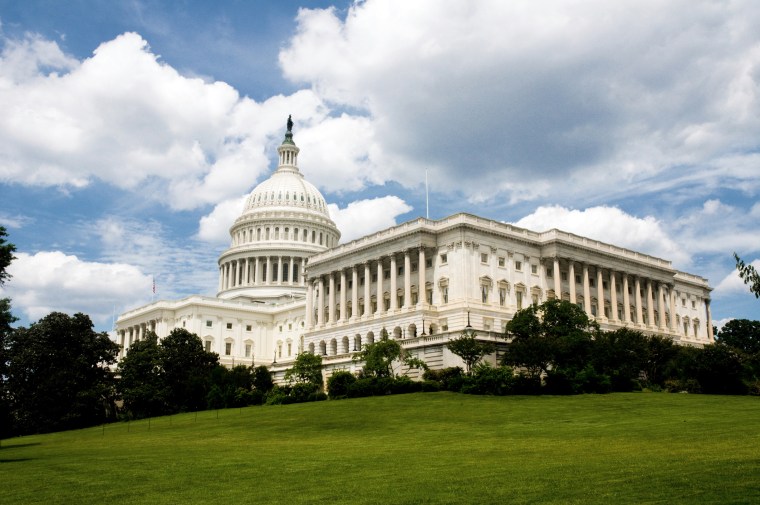First Read is a morning briefing from Meet the Press and the NBC Political Unit on the day's most important political stories and why they matter.
Will 2016 be another wave election?
Going back to 2006, four of the last five election cycles have been wave elections, in which one party has taken control of at least one branch of government or a chamber of Congress -- by winning big on Election Day. The one exception was 2012, when President Obama won re-election, but control of the House and Senate didn’t change hands (even though Democrats gained seats in both chambers).
- 2006 --> Democrats take control of House and Senate WAVE
- 2008 --> Democrats take control of the White House WAVE
- 2010 --> GOP takes control of the House WAVE
- 2012 --> Status quo: Dems keep control of the White House and Senate, GOP keeps House
- 2014 --> GOP takes control of the Senate WAVE
So the question with Election Day less than three weeks from now is: Is 2016 going to be yet another wave? Or will be it a status-quo election? The answer hinges on if Democrats take back control of the Senate -- and by a comfortable margin.
Our Top 9 Senate takeovers
Here’s a helpful way to keep score of the Senate races, and what constitutes a wave. We’ve listed what we consider to be the Top 9 Senate takeovers -- from most likely to switch parties, to least likely to switch.
- Illinois (R -- Kirk )
- Wisconsin (R -- Johnson)
- Pennsylvania (R -- Toomey)
- Indiana (R --OPEN)
- Missouri (R -- Blunt)
- Nevada (D -- OPEN)
- North Carolina (R -- Burr)
- New Hampshire (R -- Ayotte)
- Florida (R -- Rubio)
If Hillary Clinton wins the White House, Democrats would need to net a gain of four Senate seats to retake control of the chamber. So running the table here -- or close to it -- would put Dems at 52-54 seats, and that would constitute a wave. By the way, we listed nine takeovers instead of 10 takeovers, because the others in consideration (Arizona, Iowa, Ohio) are unlikely to flip, even if there’s a wave. We could see the races in those three states getting to single digits, but it’s still very hard to see even a huge Clinton win being enough to oust the GOP incumbents there.
The Funky Runoffs
There are two more Senate races worth watching on Election Day -- the runoffs in Georgia and Louisiana. Sen. Johnny Isakson (R-GA) is the clear favorite in Georgia, but he needs to get clear 50% to avoid a runoff since there’s a Libertarian candidate in the race. Also, Louisiana holds its free-for-all “jungle primary” on Nov. 8 to replace retiring Sen. David Vitter (R-LA), and the top-two finishers (regardless of party) advance to the Dec. 10 runoff if no one clears 50%. David Duke is one of the numerous Republicans on the ballot.
It’s likely that the number of female senators will increase
There’s one more Senate-related point we want to make: It’s highly likely that the number of women in the Senate will increase. Yes, Chris Van Hollen’s primary victory in Maryland will reduce the Senate’s female ranks by one. And Sen. Barbara Boxer will be replaced by either Kamala Harris or Loretta Sanchez. But here are the possible female additions:
- Illinois: Tammy Duckworth
- North Carolina: Deborah Ross
- Nevada: Catherine Cortez Masto
- Pennsylvania: Katie McGinty
- Arizona: Ann Kirkpatrick
So it’s very possible the Senate’s female ranks will increase by two or three.
Clinton has benefited more from the debates than Trump has
Tonight is the third and final presidential debate, and it takes place at 9:00 pm ET in Las Vegas, NV. Our most recent NBC/WSJ poll found 31% of voters saying the previous two presidential debates made them more likely to back Hillary Clinton, versus 14% who said they made them more likely to support Trump; 52% said the debates made no difference.
Rockin the suburbs
One of the biggest reasons why Clinton is really pulling away from Trump? It’s all about the suburbs. The urban suburbs, a set of densely-populated, wealthy and well-educated counties, have swung heavily to Clinton since the summer. NBC News merged data from the last two NBC/WSJ polls, both in the field in the last two weeks, and found Clinton had a 26-point edge in those counties. A set of polls taken over this summer showed she had a much smaller 13-point lead in the same areas. In 2012, President Barack Obama carried the urban suburbs by 16 points, 10 points less than Clinton’s current margin.
Trump’s term limits pledge
Yesterday, the GOP nominee pledged to push for term limits for members of Congress – six years for House members and 12 years for senators. Yes, term limits are a common conservative proposal, but if you wanted more proof that Trump is running against the GOP -- which happens to be in control of Congress -- this pledge is it. What does this say for Richard Burr, Chuck Grassley, and John McCain? (Not to mention close Trump adviser Jeff Sessions?)
First Read’s downballot race of the day
Wisconsin: Democrat Russ Feingold was bounced from his seat in 2010, and he’s trying to snatch it back this cycle from his old rival, Republican Ron Johnson. The two men are ideologically opposed in this traditionally blue-leaning state; Feingold is a progressive champion, while Johnson has been a staunch conservative. If Feingold is victorious, it will be the first time since 1934 that an ousted senator came back six years later to defeat his former foe.
On the trail
Tim Kaine campaigns in Ohio and North Carolina… Mike Pence hits Colorado… Bernie Sanders campaigns for Clinton in Nevada… And Chelsea Clinton is in Arizona.
Countdown to Election Day: 20 days



